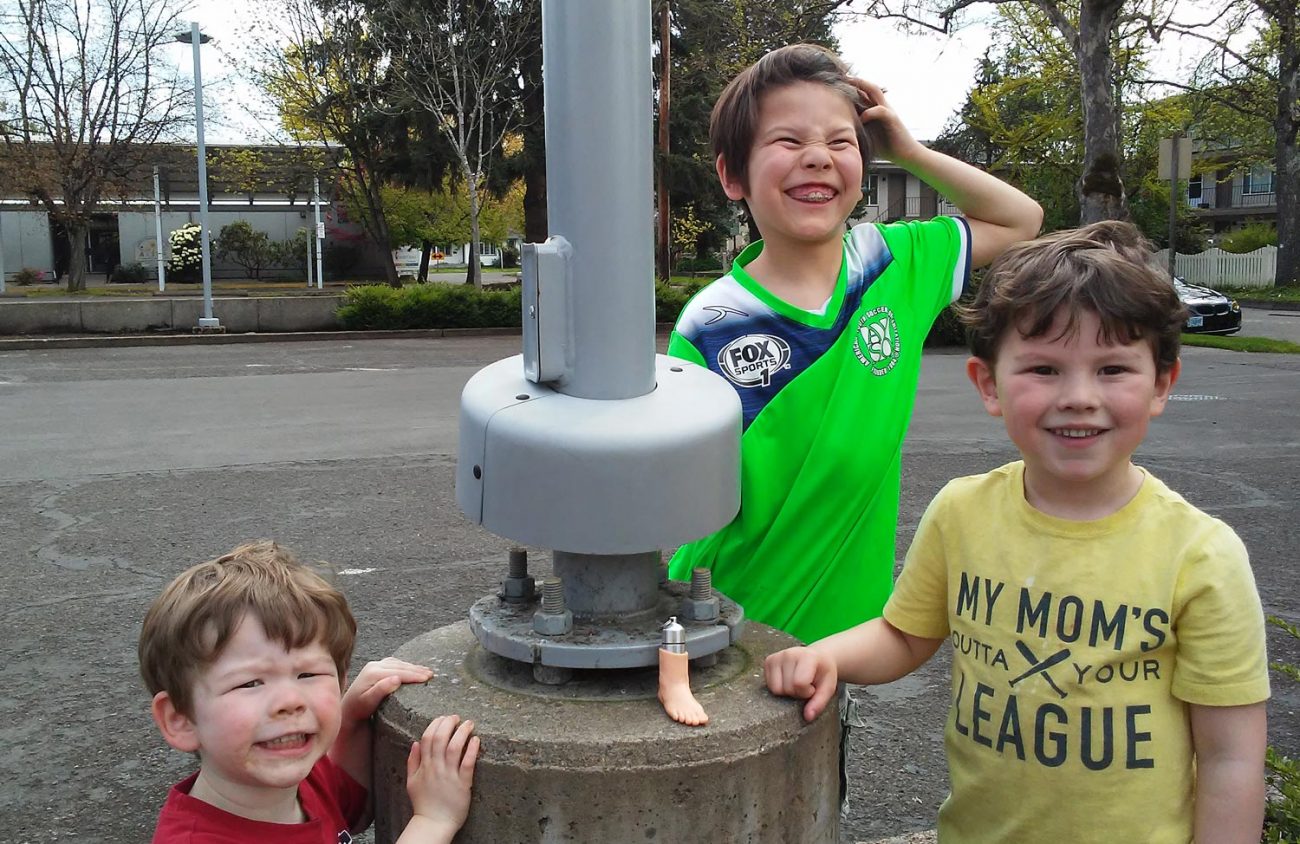I’m in a church parking lot just north of 13th Avenue in Eugene, staring at my phone, circling around the lot, looking at a little dot on my screen and wondering why I can’t find what I’m looking for.
Two of my nephews, ages 6 and 9, are wondering if what we’re looking for might be the trash in the bushes. The 2-year-old has a can to play drums on and couldn’t care less.
I’m getting frustrated and quite frankly a little embarrassed. I feel like one of the Poké-zombies that stalked pretty much every city in the world last summer. You’ll remember them if you use the bike path or ever wondered what the heck was going on outside of Bier Stein in July and August.
But our prize isn’t a Charizard or Pikachu. The name for this treasure on the app is “Get a Kick Out of Caching!” and the prize that we eventually find is a 3-inch-long plastic foot with a screwtop. It has a piece of paper that some people sign and some put their own personal stamp on. People from as far away as Australia have left their mark on this little treasure hidden near downtown Eugene.
Geocaching is a modern treasure hunting game started by an Oregonian, Dave Ulmer, and now played by millions around the world. The idea of geocaching is that one player hides some sort of logbook or treasure and posts the GPS coordinates for other players to find.
In its early days it was a fringe hobby embraced by techies and early GPS adopters. Today, geocaching is one free download or cheap app purchase away for anyone, and it’s accompanied by a whole suite of products — including scenic and historical tours, as well as geology and natural history lessons.
The Northwest is a sort of geocaching mecca, with the game originating here and the offices for the geocaching.com based in Seattle. There are over 200 geocaches posted on the Geocaching app in the Eugene area, though some of the ones posted years ago may not still be there (as I found out on multiple occasions).
The basic allure of geocaching is two-fold: you get to use your technology outdoors and you get to play a game that includes points and sometimes even prizes. The ubiquity of the game, which you can access on any smartphone, also means that you can play pretty much wherever you are. In Lane County, you can find geocaches from the coast to the crest of the Cascades and all over Springfield and Eugene.
Recognizing the growing popularity of the game, Travel Lane County has organized geocaching adventures throughout the county. While the local tourism organization is scaling back from the more extensive geo-tours of the last few years, it will continue to offer four geocaching trails which should be ready by the end of May.
These trails take tourists and locals on geocaching-inspired tours of the McKenzie River Highway, Oakridge and Westfir, the Territorial Highway and Florence. The trails offer opportunities for people to visit and treasure hunt in parts of the county that they might not otherwise see.
“It combines outdoors with technology,” says vice-president of tourism marketing for Travel Lane County, Natalie Inouye. “What an awesome way to get people into the outdoors and to get kids and families out there.” Inouye has led the development of the organization’s geocaching program, which has garnered interest from visitors and residents alike.
The trails take about two days to complete and are aimed at getting people out and about in the county and extending the stays of tourists passing through. A focus of the activity has been to cater to families and offer trails that are accessible to people of all physical abilities. “I see us as being kind of an intro to geocaching,” Inouye says. “It lets people play around and get familiar with the game.”
She says she’s heard plenty of stories from people who have fallen in love with geocaching and used the activity as a way to get exercise and also entertain younger children.
While geocaching has broad appeal as a way to entertain kiddos, tour unfamiliar locales and play a game outside, for me it didn’t really lend itself to immersing myself in nature. As someone who enjoys hiking as a time to reflect, relax and detach I found myself getting annoyed as I stared at my phone in pursuit of elusive caches.
Geocaching was a fun way to entertain my nephews with a little treasure hunt, but not something I’m likely to do next time I hit the trail. But that’s the beauty of geocaching: You can do it just about wherever or whenever you want, and as soon as you’re over it, all you have to do is put your phone away.
Carl’s Totally Beginner Tips for Geocaching
• If you’re with kids, check out the general area first and bring hand sanitizer. We ran into some spots that weren’t worth digging through because of all the litter.
• Switch the app from street view to satellite. It will be much easier to identify landmarks to help you find the caches.
• Start small, especially if you’re caching with kids setting a goal of three or four caches is a great place to begin.
• The newer the better! When you are searching for caches check to see when they were placed. Many of the older ones are either very hard to find or no longer there.
• Stay on the trail (even if the cache isn’t). Not only will this help keep the trail intact and stop you from disturbing plants and wildlife, it’s a good way to avoid poison oak (trust me, I have the rashes to prove it).
